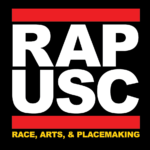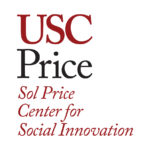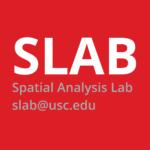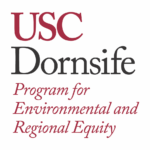The Race, Arts, + Placemaking (RAP) Faculty Collaborative’s main public event for 2017 is the co-organized conference Forward LA. The program from the two days is available below, also en español. We will be updating this website with captioned photos, video highlights, and oral histories. In the meantime,
VIDEOS of the conference can be viewed HERE.
RAP conference music playlists are available HERE.

April 27-28, 2017
Radisson Hotel
3540 South Figueroa Street, Los Angeles, CA 90007
Our conference, Race, Arts, and Inclusive Placemaking after the 1992 Civil Unrest, takes stock at the 25th anniversary of the 1992 LA Civil Unrest, a seminal moment which sparked a national discussion about the conflicts in our cities. Since then, Los Angeles has been rebuilding itself in important ways that are timely to add to the nation’s current discussion about racial injustice, freedom, and opportunity in the city.
We bring together academics, activists, community members, and artists to share rich data-driven stories of neighborhood change, of catalytic alliances between social movement organizations, and the role that arts and culture have played in transforming LA’s built environment and inter-cultural understanding. We also grapple with the new permutations of persistent urban challenges such as development without displacement, police-community trust, and building relationships between generations of movements, organizations, and communities.
The first day of the conference will explore the ways in which demographics, data, social innovation, and local economic opportunity are shaping unique challenges and opportunities within Los Angeles communities. The second day will focus on the ways that innovative Angelenos’ arts and culture practices have helped to rebuild redemptive spaces in LA through food, arts, cinema, media, music, and performance. Simultaneous interpretation into Spanish provided by Antena Los Ángeles.
THURSDAY
Empowering Opportunity
Neighborhood Change
9:45AM
Demographic Change – 1992 to 2017
Demographic change has been a narrative in the City of Los Angeles since its inception as a settlement in colonial New Spain in 1781. These population shifts continue to mold and shape the neighborhoods and cultural life of the region. This panel will discuss some of the demographic changes in the decades leading up to 1992, transitions since then, and how we might expect Los Angeles’ neighborhoods to evolve in the next 25 years.
Dowell Myers, Professor, USC Sol Price School of Public Policy (Introduction)
Darnell Hunt, Professor and Chair of the UCLA Department of Sociology, and Director, Bunche Center for African American Studies
Ed Park, Professor, Asian Pacific American Studies Program at Loyola Marymount University
Alberto Retana, President and Chief Executive Officer, Community Coalition
Jody Agius Vallejo, Associate Professor, USC Dornsife College of Letters, Arts, and Sciences (Moderator)
11AM
Opportunity Neighborhoods (Data Stories)
While recent research has documented the benefits of living in low poverty neighborhoods (see the Chetty et al research on Moving to Opportunity as an example), there remains much debate about what are the mechanisms that help families thrive. Measures of neighborhood opportunity are commonly focused on a school’s test scores, the average education or income of the area, but these measures are often connected to high cost of living areas and may miss important predictors of success such as social cohesion, access to civic resources and other important factors. This session will discuss how to measure opportunity neighborhoods and how policies can be developed to ensure that no neighborhood is devoid of the necessary characteristics for all families to thrive.
Jackie Dupont Walker, Los Angeles Metro Board Member and President of Ward Economic Development Corporation
Salin Geevarghese, Senior Advisor, Center for the Study of Social Policy
Angela Johnson Meszaros, Staff Attorney, EarthJustice
Meg Palisoc, Co-Founder and Chief Executive Officer, Synergy Academies
12PM
Lunch Keynote: MARQUEECE HARRIS-DAWSON
Los Angeles City Councilmember, District 8
Manuel Pastor: Professor, USC Department of Sociology and Director, Program for Environmental and Regional Equity (Introduction)
1PM
Health Disparities
Health disparities across income strata and race and ethnicity have been well recognized in the literature. Residents of high poverty neighborhoods often face multiple disadvantages that impact their health. Unfortunately, health data are often not available in a disaggregated fashion to allow community actors to target and develop interventions in neighborhoods. The advent of the 500 Cities project (https://www.cdc.gov/500cities/) provides an opportunity to obtain data on a variety of health outcomes at the Census tract level. This panel will answer questions concerning what neighborhood data will allow community stakeholders to do as well as discuss the challenges that exist in reducing health disparities in low income communities.
Tamu Jones, Program Manager, Building Healthy Communities South Los Angeles, The California Endowment
LaVonna Lewis, Professor, USC Sol Price School of Public Policy
John Moon, District Manager, Community Development, Federal Reserve Bank of San Francisco
William Vega, Provost Professor, USC Suzanne Dworak-Peck School of Social Work and Executive Director, USC Edward R. Roybal Institute on Aging
Dana Goldman, Professor and Leonard D. Schaeffer Chair and Director, USC Schaeffer Center for Health Policy and Economics (Moderator)
2PM
Data as a Driver of Social Innovation
While data continues to become available at an increasing rate, there remain challenges to leveraging these data to facilitate regional wide assessments of social innovation. Some of the current challenges include a lack of current and consistent data, as well as the ability to demonstrate the relationships between various data sets, i.e. neighborhood crime and suspension rates within a particular school system, or neighborhood foreclosure rates and childhood obesity levels. This session will discuss what is necessary for data to become an intervention that facilitates neighborhood change, and how community actors can use these data to achieve collective objectives.
Lilian Coral, Chief Data Officer, Office of Los Angeles Mayor Eric Garcetti
Michael McAfee, President, PolicyLink
Clarence Wardell, Director of Repurposing for Results, What Works Cities Initiatives
Gary Painter, Professor, USC Sol Price School of Public Policy and Director, Sol Price Center for Social Innovation (Moderator)
3:15PM
Which Way, South LA: Making the Future in South Los Angeles
Presented by: The Turpanjian Chair in Civil Society and Social Change
This panel will be a moderated discussion among dynamic South LA leaders who are working towards a socially just and economically prosperous future. Panelists will discuss the root causes of the 1992 uprising, the on-going struggles, and the new challenges facing South LA, and the community-led efforts to improve conditions over the past 25 years. A focus will be on community-led efforts to improve conditions over the past 25 years, specifically on the grassroots organizing, power-building approaches, and strategic campaigns.
Laurence Frank, President, Los Angeles Trade-Technical College
Aurea Montes-Rodriguez, Executive Vice President, Community Coalition
Tunua Thrash-Ntuk, Executive Director, Los Angeles Local Initiatives Support Corporation
Gloria Walton, President and CEO, Strategic Concepts in Organizing and Policy Education
Pete White, Executive Director and Founder, Los Angeles Community Action Network
Manuel Pastor, USC Program for Environmental and Regional Equity, Turpanjian Chair in Civil Society and Social Change (Moderator)
5PM
Reception:
An Evening of Reflection: 25 years after the L.A. Riots
USC Dornsife College of Letters, Arts and Sciences invites you to join us for an evening of reflection. Come experience the digital archive of images surrounding the 1992 Los Angeles Riots while networking with fellow Trojans and friends. The networking reception will be followed by a series of conversations with university and community leaders that will discuss lessons learned and how we should continue to move Los Angeles forward.
Reflections from the 1992 LA Riots
Professor William Deverell, Director of the Huntington-USC Institute on California and the West and Professor of History
Rev. Dr. Cecil “Chip” Murray, University Fellow
Los Angeles 25 years Later and Beyond
Professor Ange-Marie Hancock, Professor of Political Science, Gender Studies & Sociology, USC Dornsife College of Letters, Arts and Sciences
Faculty Master, New-North Residential College
Rev. Mark Whitlock, Executive Director of the USC Cecil Murray Center for Community Engagement
Dr. Anthony Otero, Sergeant II at LAPD
FRIDAY
Arts + Culture
Rebuilding LA
9AM
ART SPACES in the City: Desegregating Art Geographies
This session brings together artists and organizations who have been working to break down LA’s segregated art geography by where they situate themselves in the city, their connections to insider and outsider arts, and practices to engage local communities and the larger public. We will also discuss the challenge of how art can raise a community’s self-value without igniting displacement and gentrification.
Jacqueline Alexander-Sykes, St. Elmo’s Village, Administrative Director
Anne Bray, Freewaves, Executive Director
Jamillah James, Institute of Contemporary Art Los Angeles, Head Curator
Megan Steinman, Underground Museum, Director
Dewey Tafoya, Self-help Graphics, Artist in Residence
Annette Kim, Price School of Public Policy (RAP USC faculty moderator)
10:30 AM
FOOD JUSTICE: Campus + Community relations around food and space
In 1992, food disparities were already on the South Los Angeles reform agenda, but in the 25 years since, food equity has become a central element of a broader movement. This panel examines two aspects of LA’s food equity movement: first, how have community-based organizations created change through new community gardens, farmer’s markets, and healthier food supply, and two, what has been the role of food in the evolution of USC and its community relationships?
Erika Chesley, USC Hospitality
Mark Glassock, LA Neighborhood Land Trust, Director of Special Projects
Nancy Halpern Ibrahim, Esperanza Community Housing
Neelam Sharma, Community Services Unlimited, Executive Director
David Sloane, Price School of Public Policy (RAP USC faculty moderator)
12PM
Lunch Keynote: LOCOLS
Calling itself a “fast food revolution”, Locol restaurant in Watts offers a business model for producing healthy, affordable, chef-created food that employs and serves the local community.
Roy Choi and Locol crew members Carnisha Coleman, Keith Corbin, Lydia Friend
Josh Kun, Annenberg School of Communication (RAP USC faculty moderator)
1PM
CINEMA: Independent Voices and Transmedia Strategies
These film and media content creators of color share the creative strategies they have had to employ to have their vision and voices heard. Their projects offer counter-narratives to racialized mainstream news and entertainment and search for ways to connect to social action.
Justin Chon, Independent director, writer, actor, Sundance NEXT audience award winner for film Gook
Grace Lee, Independent Producer, Director, and Writer, Peabody Award-winning American Revolutionary and KTown92
Maurício Mota, President Wise Entertainment and Executive Producer of Emmy-award winning East Los High
Colin Maclay, Annenberg School of Communication, (RAP USC faculty moderator)
2:30PM
HIP HOP: ‘Alright’, Civic Engagement, and Stories of Resistance
Starting with a viewing of Kendrick Lamar’s Alright video, the panel deliberates the racialized body in the city and the power of visuals and music in processes of civic engagement and building stories of resistance.
Dr. Melina Abdullah, Professor and Chair, Pan-African Studies, Cal State LA, Original organizer and LA Chapter Lead of Black Lives Matter
Dr. E. Moncell Durden, Assistant Professor, USC Kaufman School of Dance
Dr. Anthony J. Ratcliff, Assistant Professor, Pan-African Studies, Cal State LA
Taj Frazier, Annenberg School of Communication (RAP USC faculty moderator)
Lanita Jacobs, Dornsife College of Letters, Arts, and Sciences (RAP USC faculty moderator)
4PM
PERFORMANCE: Mic Sessions, Youth, and Emotional Literacy
For over three decades Mic Sessions and Aim4theHeart.org (AIM) has utilized arts as a vehicle to teach emotional literacy. This work continues to transform the hearts and minds of at risk youth. Founder Leila Steinberg (whose work helped shaped the legendary artist Tupac Shakur) along with Law Professor Jody Armour and AIM”S artists will present a one hour introduction to AIM’s work.
Leila Steinberg and AIM4TheHeART.org artists
Jody Armour, Gould School of Law, (RAP USC faculty moderator)
SPECIAL FEATURES of the Conference include:
- Neighborhood Data for Social Change Demonstration
- South LA Photo Exhibit by Matt Gainer and Daniel Walker
- LA Oral History Booth
- LA 1992 and 2017 music playlists curated by Josh Kun
Co-Organizers include:
Sol Price Center for Social Innovation
SLAB: the Spatial Analysis Lab of USC Price
RAP USC: Race, Arts, and Placemaking Faculty Collaborative
USC Program for Environmental and Regional Equity
USC Dornsife Alumni Relations
The organizers would like to acknowledge the generous support from the following members of the Trojan family:
Price Philanthropies
Turpanjian Chair in Civil Society and Social Change
Dennis and Brooks Holt
Michael and Sarah Chang
Daniel and Sherry Gi
We would also like to acknowledge the generous support of USC allies:
USC Provost Office Research Collaboration Fund
Visions and Voices Program
Price School of Public Policy
USC Digital Humanities Program






